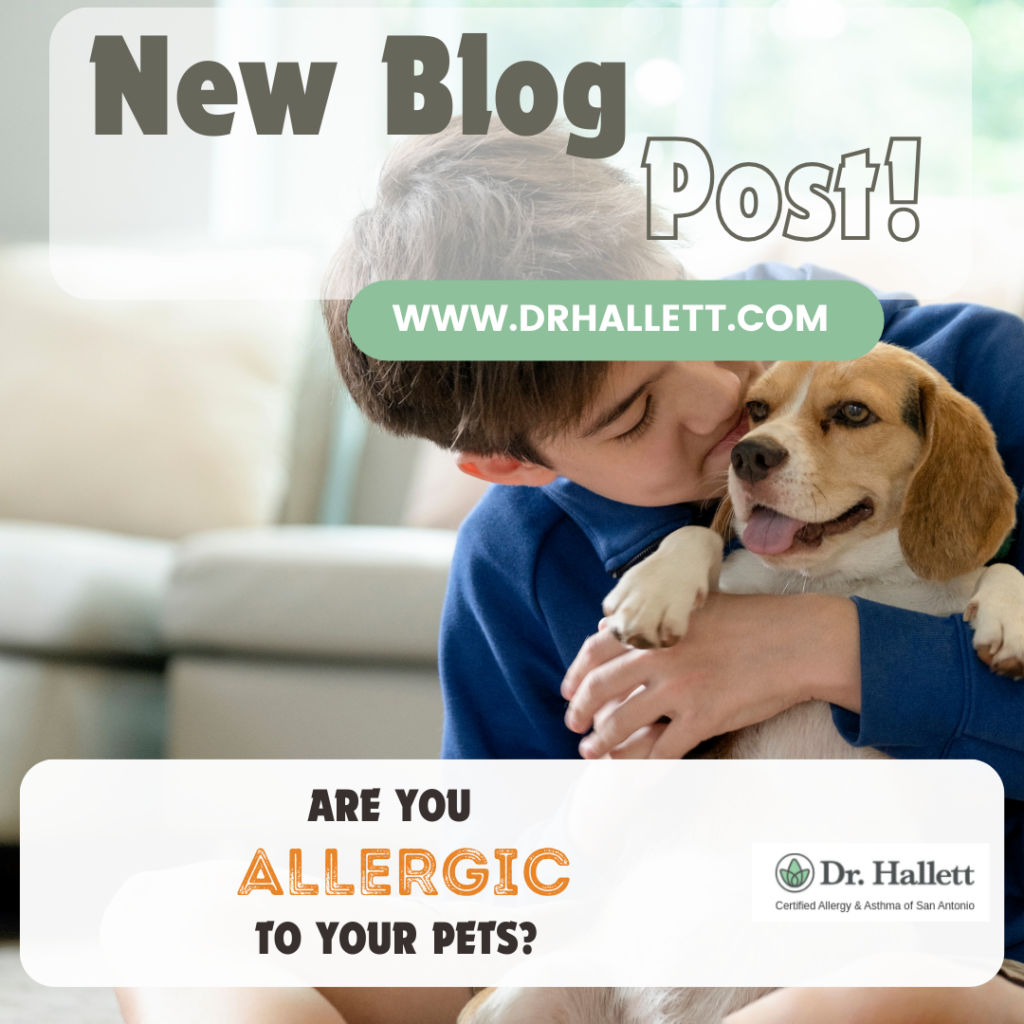By: Kaelyn Lacefield
For many people, pets are cherished family members, offering companionship, love, and joy. However, if you sneeze, cough, or have itchy skin around your furry friend, you might suffer from a pet allergy. Pet allergies are more common than you think and can cause a range of symptoms that affect your daily life.

Common Symptoms of Pet Allergies
Pet allergies are triggered by proteins found in an animal’s skin cells (dander), saliva, and urine. When these allergens become airborne or come into direct contact with your skin, they can cause various reactions. Common symptoms of pet allergies include:
- Nasal Symptoms: Nasal symptoms are often the most common initial indicators of pet allergies, as airborne allergens can irritate sensitive nasal passages. These symptoms may include:
- Sneezing
- Runny or congested nose
- Postnasal drip
- Itchy nose, throat, or roof of the mouth
- Eye Symptoms:
- Itchy, red, or watery eyes
- Skin Reactions:
- Raised, red patches (hives)
- Itchy skin
- Eczema
- Respiratory Symptoms (similar to asthma):
- Wheezing
- Chest tightness
- Shortness of breath
- Persistent cough
In some cases, symptoms can be mistaken for a common cold. If symptoms persist for more than two weeks and worsen when you’re near animals, it’s worth considering a pet allergy as the cause. Consulting an allergist or healthcare professional can help confirm the diagnosis and provide a tailored treatment plan.
When to See a Doctor
If your symptoms are severe or if you experience difficulty breathing, chest pain, or wheezing, consult a doctor immediately. You should also seek professional advice if allergy symptoms affect your quality of life or if over-the-counter medications provide insufficient relief. Emergency care may be necessary for rapidly worsening symptoms or significant breathing difficulties.
Causes of Pet Allergies
Pet allergies occur when your immune system mistakenly identifies harmless animal proteins as threats, triggering the production of immunoglobulin E (IgE) antibodies. These antibodies cause the release of histamine and other chemicals, leading to inflammation and allergy symptoms. This triggers the production of antibodies, leading to inflammation in the nasal passages, lungs, or skin. While any animal with fur can cause allergies, cats and dogs are the most common culprits. Dander from these pets remains airborne for long periods and easily clings to furniture and clothing.
Smaller pets like rabbits, hamsters, and guinea pigs also produce allergens through their fur, saliva, and urine. Regular cage cleaning is essential to minimize allergen buildup and reduce airborne particles. Dust from cage bedding can contribute to airborne allergens. However, reptiles and fish rarely cause allergic reactions.
Managing and Reducing Pet Allergy Symptoms
If you suspect a pet allergy but don’t want to part with your beloved animal, several strategies can help minimize exposure:
- Create Allergen-Free Zones: Creating pet-free areas, particularly in bedrooms or spaces where you spend significant time, can greatly improve sleep quality and overall symptom relief by reducing direct exposure to allergens. For best results, use high-efficiency particulate air (HEPA) purifiers in these zones to further minimize airborne dander and allergens. Keep pets out of bedrooms or designated allergen-free rooms.
- Use HEPA Filters: High-efficiency particulate air (HEPA) filters can reduce airborne allergens.
- Frequent Cleaning: Vacuum with a HEPA-filter vacuum and wash pet bedding regularly.
- Bathe Pets: Regularly bathing your pet (if appropriate) can help reduce dander.
- Allergy Medications: Antihistamines, decongestants, and nasal sprays can alleviate symptoms. Consult your doctor for personalized recommendations.
Preventing Future Allergies
Before adopting a pet, consider allergy testing to determine your sensitivity. If allergies are present, hypoallergenic pets—though not completely free of allergens—may shed less dander.
Pet allergies are a common challenge, but with proper management and medical advice, you can still enjoy a healthy, happy life with your furry friends. If you suspect a pet allergy, schedule an appointment with your healthcare provider to discuss tailored treatment options.